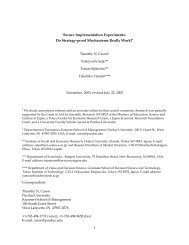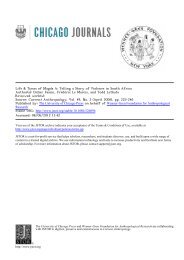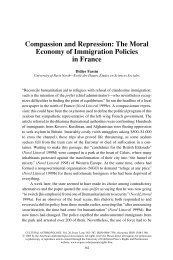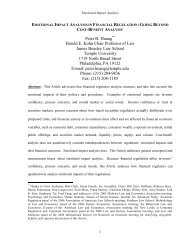Governance, Growth, and Development Decision-making - School of ...
Governance, Growth, and Development Decision-making - School of ...
Governance, Growth, and Development Decision-making - School of ...
You also want an ePaper? Increase the reach of your titles
YUMPU automatically turns print PDFs into web optimized ePapers that Google loves.
political arrangements. In terms <strong>of</strong> economic outcomes, however,<br />
the open access order has proven much more successful at sustaining<br />
positive rates <strong>of</strong> growth over long periods in comparison to the<br />
more erratic stop <strong>and</strong> go character <strong>of</strong> economies in limited access<br />
societies. Similarly, the political framework has been more stable in<br />
the sense <strong>of</strong> fewer coups <strong>and</strong> other forms <strong>of</strong> disorder. The greater<br />
stability <strong>of</strong> open access orders does not stem from greater rigidity in<br />
social arrangements but from the opposite, from more fluid social<br />
arrangements that allow that order to respond more flexibly to<br />
changing conditions.<br />
How is the transition made from one social order to another?<br />
Our book outlines the transition to open access orders in Britain,<br />
France, <strong>and</strong> the United States.<br />
While the transition in each society depended on specific<br />
features <strong>of</strong> that society, there are common features to the transition.<br />
As a consequence, while the first transitions do not <strong>of</strong>fer easily<br />
applicable modules or lessons for promoting development in today’s<br />
natural states, they do provide critical clues to today’s development<br />
problems. The doorstep conditions make it possible for elites to deal<br />
with each other impersonally, to reduce the incidence <strong>of</strong> disruptive<br />
violence, <strong>and</strong> ultimately to create <strong>and</strong> sustain impersonal elite rights.<br />
In each case, elites faced incentives to transform privileges into impersonal<br />
rights. The creation <strong>of</strong> a few elite rights under the doorstep<br />
conditions opens an opportunity to extend elite rights in a way that<br />
can be credibly sustained by the entire elite.<br />
The privilege <strong>of</strong> owning shares in a joint-stock company may<br />
begin as a unique privilege. But if that privilege becomes widespread<br />
<strong>and</strong> shares are transferable—for example, because elites realize these<br />
changes will increase the value <strong>of</strong> their shares—then an elite interest<br />
in supporting impersonal exchange <strong>of</strong> shares can exist. Impersonal<br />
exchange in shares, in turn, may create an interest in impersonal formation<br />
<strong>of</strong> companies, forces that clearly came to the fore in all three<br />
countries in the late 18th <strong>and</strong> early 19th centuries. Open access to<br />
corporate forms becomes credible when large numbers <strong>of</strong> elite benefit<br />
directly. In a similar way open access to political organizations<br />
12<br />
<strong>Governance</strong>, <strong>Growth</strong>, <strong>and</strong> <strong>Development</strong> <strong>Decision</strong>-<strong>making</strong>
















